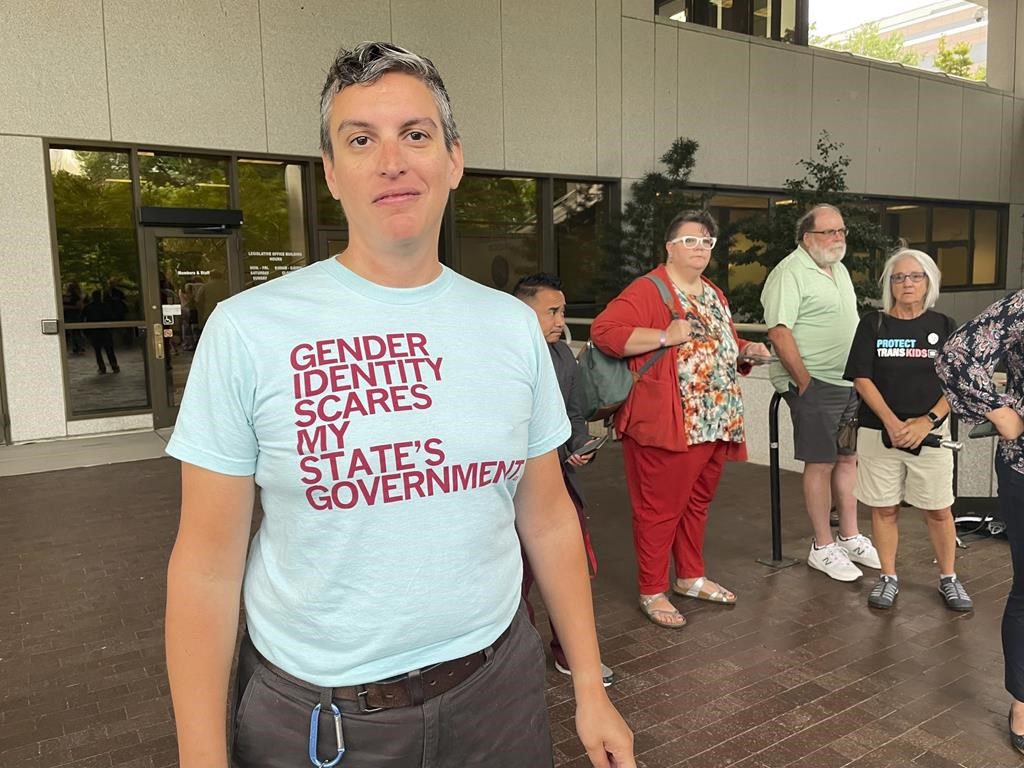RALEIGH, N.C. (AP) — Transgender rights are taking center stage Tuesday in North Carolina as the GOP-controlled General Assembly considers legislation to restrict gender-affirming health care and trans participation in sports.
The legislative push comes in the dwindling days of the North Carolina session and as many Republican-led state legislatures round out a record year of legislation targeting transgender residents.
Hours after the House Health Committee advanced a bill banning state facilities from treating trans minors with hormones and gender-affirming surgeries, the Senate will vote later Tuesday on whether to ban trans girls from playing on school sports teams that align with their gender identity.
Democratic Gov. Roy Cooper has little power to block legislation now that Republicans hold veto-proof majorities in both chambers.
If it passes the Senate on Tuesday, the bill prohibiting trans girls from playing on girls’ middle school, high school and college sports teams could return to the House floor for final approval as early as Wednesday. Both chambers passed different versions before legislative leaders opted to proceed with the House bill.
House members gutted the Senate version Tuesday morning, using it as a vehicle to resurrect gender-affirming care restrictions that some trans minors, like 15-year-old Rowan Bilodeau, said would limit their access to life-saving treatments.
“My access to gender-affirming care saved my life,” he said. “I want others to have that same opportunity. I’m tired of seeing my brothers and sisters die because they’re being denied their rights.”
Bilodeau, a high school sophomore from Pittsboro, was the only trans person given time to testify Tuesday morning in committee. Trans youth already experience higher rates of suicidal ideation than their cisgender peers, he told lawmakers, and this legislation could make that tragic situation even worse.
The proposal prohibits public health care facilities, including public hospitals and University of North Carolina affiliates, from performing any surgical gender transition procedure on a minor or providing them with puberty-blocking drugs or cross-sex hormones. It also prohibits using state funds to pay for any gender transition procedure.
Gender-affirming treatments for gender dysphoria are considered safe and medically necessary by the leading professional health associations, including the American Academy of Pediatrics, the American Medical Association and the Endocrine Society. While trans minors very rarely receive surgical interventions, they are commonly prescribed drugs to delay puberty and sometimes begin taking hormones before they reach adulthood.
Rep. Timothy Reeder, a Pitt County Republican, urged lawmakers to reject claims that gender-affirming care is safe and well-researched.
“The bill is not an attempt to limit treatment for children suffering from gender dysphoria or those struggling to form their identity,” he said. “Rather, it seeks to limit children from potentially life-altering treatments before they are truly able to understand and consent to these interventions.”
The debate Tuesday drew Prisha Mosley, a prominent advocate against gender-affirming care, who told legislators she “suffered severe and lasting injuries” from the gender-transition treatments she received as a minor growing up in North Carolina. Mosely, now 25, said a counselor convinced her at age 17 that she was actually a boy, leading her to take testosterone and receive surgery to remove her breasts at age 18.
She is now part of a small group of “detransitioners,” or people who have stopped or reversed their gender transition, who have traveled this year to statehouses nationwide to affirm Republican claims that procedures offered to minors are irreversible and that regret is common. In treatment guidelines issued last year, the World Professional Association for Transgender Health said evidence of later regret is scant.
Several Democrats, including Reps. Cecil Brockman of Guilford County and Maria Cervania of Wake County, questioned why Republicans see a need to stand in the way of parents making medical decisions for their own children. Reeder responded that parents will still have a say under the bill because it only bans the procedures at state facilities.
The Senate Health Committee will hear another bill Wednesday morning that bans gender-affirming surgeries for transgender minors. That proposal passed the House last month.
D Sellars, a 40-year-old nonbinary parent from Fuquay-Varina, said the slew of bills targeting trans people in North Carolina and around the country “just marginalizes us more, just pushes us out of the mainstream more, and it gives bigots more ammunition.”
Sellars donned a “Gender Identity Scares My State’s Government” shirt Tuesday at the General Assembly, where they had hoped to testify in committee about their experience parenting a nonbinary child but were not given time to speak.
___
Hannah Schoenbaum is a corps member for the Associated Press/Report for America Statehouse News Initiative. Report for America is a nonprofit national service program that places journalists in local newsrooms to report on undercovered issues.
Hannah Schoenbaum, The Associated Press








